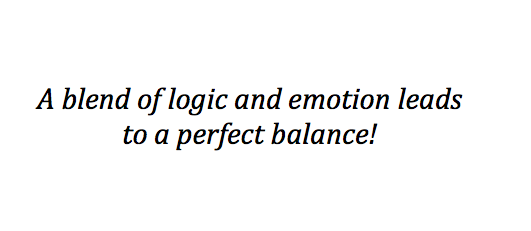Logic vs. Emotion: How to Use Your Head & Your Heart for a Well-Rounded Life!
Have the important payoffs in your life come from thinking with your head or feeling from your heart? Let’s consider the analogy of two gamblers at their prospective tables—Blackjack and Roulette.
The Blackjack gambler is constantly analyzing all of the possible outcomes as each new card appears. He counts the number of visible aces and face cards, evaluates the potential combinations, estimates the odds, predicts the other player’s moves—mentally assessing the entire process from beginning to end assuming that this gives him some sense of control over the game.
The Roulette gambler’s approach is often more “feeling-oriented.” She most likely has a specific set of “lucky” numbers that she plays with each spin of the wheel. But, it wouldn’t be surprising to see her make a few random last minute chip placements because those bets were “calling to her.” When heeding these “vibes” brings about a successful outcome, she may also feel that she has some sense of control over the game.
Logic vs. Emotion
In life, we are incessantly surveying our experience. This includes our daily interactions, the decisions we make, the current state of our relationships, the roads we travel and our overall worldview. The key concept to understand is that the way in which we perceive our experience roots itself in either logical thinking or emotional feeling.
As this topic comes up quite often in my therapy sessions, I have noticed that no matter which perception method an individual utilizes more often, the common thread is the desire to have a sense of control over their circumstances. So, the question becomes:
Is it better to have a strong foundation in logic or a considerable grasp on emotion?
Bidding With Your Brain
There are many benefits to thinking with your head. Individuals who experience life from this lens consider that there are a multitude of perspectives to take into account. The various possibilities are open to interpretation and there may be a number of “right” ways to proceed. Logical thinkers tend to ask other’s for input, weigh out the pros and cons, and research a topic until all of their senses give out. They believe that they are in control because they took the time to contemplate rather than to act on impulse.
The downside to favoring logical and critical thinking is that it takes time to scrutinize every single possible interpretation or outcome. This often leads to “dragging your feet syndrome.” These individuals tend to strive toward excellence as well, imagining that there will undoubtedly be one correct mental path to decide upon. As a result, logical thinkers commonly suffer from both procrastination and perfectionism.
Wagering With Your Heart
There are also many benefits to feeling from your heart. Individuals who are prone toward this way of perceiving consider what feels right in the moment and act on it. Behaving this way enables a more immediate result and reflects a confidence in what they believe to be the best emotional path. They trust their impulses and do not need to involve others. They feel that they are in control because they listened to their own wants and needs in any given situation.
A possible pitfall to following your heart is that desires and emotions change fairly often and this could lead to regret. Emotional feelers sometimes trick themselves into believing that their way is the only “right” way. They focus on the positives and ignore possible red flags. They dismiss logical input from others if it does not align with their interpretations. Oftentimes, these individuals are viewed as being too naïve.
Life’s Optimal Strategy
In life, the stakes are often high. In my opinion, a blend of logic and emotion leads to a perfect balance. Considering both is an exercise in personal growth. The next time you are faced with a decision or an interpretation, challenge yourself by going outside of your “comfort zone” and try to perceive from the other side as well. Odds are, this will be a great opportunity to gain a true sense of control over your experience.

